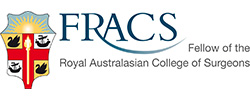Conditions Treated
General Surgeon:
- Skin malignancies
- Hernias
- Gallstones
Colorectal:
- Colon and rectal cancer – including laparoscopic surgery
- Colon polyp management
- Diverticular disease
- Surgical management of ulcerative colitis and Crohn’s disease
- Anorectal conditions (haemorrhoids, fissures, abscesses and fistulas)
- Transanal surgery for polyps and malignancy
- Bowel prolapse
- Colonoscopy / Endoscopy
What is a General Surgeon?
After completing a Medical Degree and working for a few years as a Medical Practitioner, one applies for an accredited training post with the Royal Australian College of Surgeons. This body oversees training and examination for all Surgeons. After 4 years of Surgical training and successful passing of Examinations you can receive your fellowship of the Royal Australian College of Surgeons, specialising in various fields of Surgery. Eg: General Surgery, ENT, Orthopaedics etc.
General Surgeons look after a wide range of surgical conditions including thyroid, breast, stomach, pancreas, gallbladder and biliary surgery, colorectal, skin cancer surgery.
What is a Colorectal Surgeon?
A Surgeon who specialises in disorders of the small and large bowel, rectum and anus.
This includes both benign (non-cancerous) and malignant (cancerous) problems such as:
- Colorectal cancer and polyps
- Inflammatory bowel disease including Crohn’s disease and ulcerative colitis
- Diverticular disease of the colon
- Anorectal conditions including haemorrhoids, fissures, abscesses and fistulas
- Pelvic floor disorders including bowel prolapse
- Functional bowel problems such as constipation and incontinence
In particular colorectal surgeons have been specifically trained in the diagnosis and treatment of rectal cancer. Rectal cancer treatment requires special investigations prior to surgery and specialised skills to remove the rectum. Colorectal surgeons have additional experience in this type of surgery.

.JPG&wid=1152)

